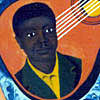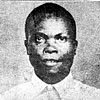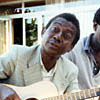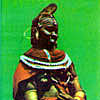[Home] [Elijah Wald Bio]
[Robert
Johnson] [Narcocorrido] [Dave Van Ronk][Josh White] [Hitchhiking]
[Other writing] [My CD and album projects] [Joseph
Spence DVD]
In 1989, I traveled across Central Africa and studied
guitar with Jean-Bosco Mwenda, Edouard Masengo and other great players
who had helped make the golden age of African acoustic playing (for a sample of what I learned, check out my Youtube videos of Jean-Bosco's "Masanga" and Herbert Misango's "Wazee Wa Kisa". In the
1950s, much of Africa experienced a surge in local recording. In the
Swahili belt, from the mining regions of the Eastern Congo to Kenya, a
series of brilliant artists blended traditional musics with new
influences from Cuba and the United States, yodeling cowboys, gospel,
and pop vocal groups. For about ten years I was selling CDs of this music, but it became too time-consuming to make them so I am regretfully quitting... but it is great music, and I hope someone else releases it all, in better quality recordings.
Jean-Bosco Mwenda and Friends:
Katanga Acoustic Guitar
Sample track:
Vijana
wapuuzi
George Mukabi:
Kenyan Guitar Master
Sample track:
Tuli Saliwa Vijana Tano
Jean-Bosco Mwenda
and Edouard Masengo
or
Edward Masengo
Sample track:
Usimsubue
Yodelers,
Guitars and Accordions:
Classic Kikuyu Music
Sample tracks:
Yodeling
Sammy Ngako
Kikuyu
accordion
JEAN-BOSCO MWENDA AND THE CONGOLESE GUITAR MASTERS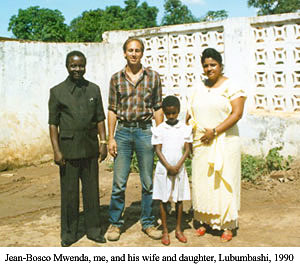
Jean-Bosco Mwenda (known later in life as Mwenda Wa Bayeke) was the most famous and influential of the virtuoso fingerstyle guitarists who flourished in Southeastern Congo, near the Zambian border, in the 1950s. His first recording, "Masanga," was imitated throughout sub-Saharan Africa, and he went on to make more than 200 records, both in the Congo and during a stay of over a year in Nairobi, Kenya, as well as performing in Europe and at the Newport Folk Festival. For more information, check out my interview with Bosco.
In the late 1950s, both Jean-Bosco and his cousin
Edouard Masengo went to Nairobi, 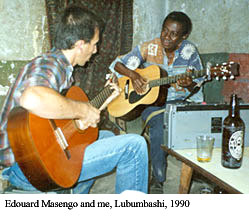 where there was a more active music
scene. Bosco got a radio job advertising a headache remedy, Aspro, but
after a little over a year he decided to go home to Lubumbashi (at that
time Elizabethville). Masengo stayed in Nairobi, where he remained a
popular performer through the 1960s. (I have posted a radio interview he did there, with numerous songs.) As a result,
alhough in the Congo he was not considered as important a figure as
Bosco or Losta Abelo, Masengo is far more popular in Kenya. His style
is lighter than Bosco's, and his guitar work less virtuosic, but there
is a lovely lilt to his singing, and he prided himself on his varied
repertoire.
where there was a more active music
scene. Bosco got a radio job advertising a headache remedy, Aspro, but
after a little over a year he decided to go home to Lubumbashi (at that
time Elizabethville). Masengo stayed in Nairobi, where he remained a
popular performer through the 1960s. (I have posted a radio interview he did there, with numerous songs.) As a result,
alhough in the Congo he was not considered as important a figure as
Bosco or Losta Abelo, Masengo is far more popular in Kenya. His style
is lighter than Bosco's, and his guitar work less virtuosic, but there
is a lovely lilt to his singing, and he prided himself on his varied
repertoire.
GEORGE MUKABI AND THE KENYA SOUND
George Mukabi was probably the finest Kenyan fingerstyle player of the 1950s. His playing is somewhat similar to that of the Congolese greats, but with a distinct local flavor. According to John Low's"History of Kenyan Guitar Music: 1945-1980" (African Music, 1982, 6(2), 17-36), Mukabi was of the Kissa people, and apparently created what became the popular "sukuti" of "Kakamega" guitar style in the early 1950s. He had heard records of the "Nyasa" Malawian bands and set out to play similar music in a fingerpicking style. His playing was massively popular and influential, affecting urban players like John Mwale. It is bizarre that none of Mukabi's material has been released outside Kenya, as he is one of the greatest of the African acoustic players. No one who loves intricate fingerpicking should be unaware of his work.
Classic Kikuyu music ranges from the wonderful Jimmie Rodgers yodeling of Sammy Ngako (the only performer I could identify by name) to a cappella choruses and accordion numbers. Many of the songs show a clear debt to American country and western, sometimes even including a fiddle. Others are obviously based on traditional local rhythms, and still others reflect combinations of these styles and even a hint of Harry Belafonte-style calypso. There is both fingerstyle and flatpicked guitar, and while none of the performers are astounding virtuosos, there is a startling variety of approaches to the instrument. As for the accordion, it sometimes suggests a relationship to zydeco, though that is clearly a matter of shared roots rather than direct interaction. The a cappella pieces sound quite traditional, including one that uses the tune of the old English children's song "The Fox Went Out on a Chilly Night." Much like American "hillbilly" or country music, this was the music of a rural population that loved its traditional styles but also sought to blend them with the new sounds arriving on the phonograph and radion, and the breadth of styles reflected the broad tastes of the Kikuyu audience.
OTHER CLASSIC AFRICAN GUITAR RECORDS:
As noted above, the great African acoustic guitarists are embarrassingly badly represented on CD. However, there is one superb series from the Dutch-based Sharp Wood label, which is reissuing many of Hugh Tracey's recordings. Tracey was the man who first recorded Jean-Bosco Mwenda and hundreds of other marvelous musicians, starting in the late 1940s. Sharp Wood has not yet done a Bosco set (though I have begged them to), but they have several collections that focus on guitar, as well as a lot of other great music of the period. The full catalog can be seen on the SWP web site, and the label's CDs are also available in stores and from Amazon. I particularly recommend:
 SWP026 The
Legendary George Sibanda. Sibanda, who is best known in the
US for his song "Gwabi Gwabi" (or "Guabi Guabi"), which was recorded by
Ramblin' Jack Elliott among others, was one of a group of excellent
guitarists from Western Zimbabwe whose recordings in the late 1940s
helped to inspire the great Zambian and Congolese wave that followed.
This is the first full album of Sibanda's 78s, and is essential for any
fan of African guitar music.
SWP026 The
Legendary George Sibanda. Sibanda, who is best known in the
US for his song "Gwabi Gwabi" (or "Guabi Guabi"), which was recorded by
Ramblin' Jack Elliott among others, was one of a group of excellent
guitarists from Western Zimbabwe whose recordings in the late 1940s
helped to inspire the great Zambian and Congolese wave that followed.
This is the first full album of Sibanda's 78s, and is essential for any
fan of African guitar music.
 SWP015
Origins of Guitar Music: Southern Congo and Northern Zambia.
Including one track from Bosco, along with other fine players recorded
by Tracey in the 1950s, this is a fine sampler of the range of styles
that flourished in the Copper Belt. I hope SWP will put out a lot more
of this in the future...
SWP015
Origins of Guitar Music: Southern Congo and Northern Zambia.
Including one track from Bosco, along with other fine players recorded
by Tracey in the 1950s, this is a fine sampler of the range of styles
that flourished in the Copper Belt. I hope SWP will put out a lot more
of this in the future...
 SWP025
Forgotten Guitars from Mozambique. Mozambique did
not produce an equivalent of the virtuoso fingerpicking heard in the
Congo, Zimbabwe and Kenya, but its players were remarkably varied and
rhythmically sophisticated, and this is an excellent introduction to
their work.
SWP025
Forgotten Guitars from Mozambique. Mozambique did
not produce an equivalent of the virtuoso fingerpicking heard in the
Congo, Zimbabwe and Kenya, but its players were remarkably varied and
rhythmically sophisticated, and this is an excellent introduction to
their work.
 There are
also two videos that should be of interest to anyone who loves this
music. African
Guitar includes film of Jean-Bosco Mwenda and other African
acoustic players, made by the Austrian musicologist Gerhard Kubik.
There are
also two videos that should be of interest to anyone who loves this
music. African
Guitar includes film of Jean-Bosco Mwenda and other African
acoustic players, made by the Austrian musicologist Gerhard Kubik.
![]() For guitarists who want to learn more about this
style, African
Fingerstyle Guitar is a fine guide to the techniques of
Jean-Bosco Mwenda, Losta Abelo and George Mukabi, taught by John Low.
Low studied with Bosco and Losta, and played with many of Mukabi's
associates, and now that they are gone, his video is as close as you
can get to studying with the masters themselves.
For guitarists who want to learn more about this
style, African
Fingerstyle Guitar is a fine guide to the techniques of
Jean-Bosco Mwenda, Losta Abelo and George Mukabi, taught by John Low.
Low studied with Bosco and Losta, and played with many of Mukabi's
associates, and now that they are gone, his video is as close as you
can get to studying with the masters themselves.
 Though it is not a fingerstyle guitar album, I also recommend Songs of the African Coast: Cafe Music of Liberia,
a charming collection of songs, many of them in Pidgin English,
recorded in Liberia in 1948.
Though it is not a fingerstyle guitar album, I also recommend Songs of the African Coast: Cafe Music of Liberia,
a charming collection of songs, many of them in Pidgin English,
recorded in Liberia in 1948.
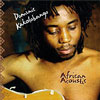 Then there
is my good friend and sometime partner, Dominic Kakolobango, a fine
Zambian singer, guitarist, and songwriter who got his start playing on
the streets of Lubumbashi with Losta Abelo, and who was my host when I
was studying with Bosco and Masengo. I worked with Dominic on this
album, African Acoustic, a collection of original
songs, versions of classic Congolese pieces, and even a Swahili version
of a Mance Lipscomb blues. It is mostly acoustic, but also has some
tasteful duets with the electric soukous player Dizzy Manjeku.
Then there
is my good friend and sometime partner, Dominic Kakolobango, a fine
Zambian singer, guitarist, and songwriter who got his start playing on
the streets of Lubumbashi with Losta Abelo, and who was my host when I
was studying with Bosco and Masengo. I worked with Dominic on this
album, African Acoustic, a collection of original
songs, versions of classic Congolese pieces, and even a Swahili version
of a Mance Lipscomb blues. It is mostly acoustic, but also has some
tasteful duets with the electric soukous player Dizzy Manjeku.
